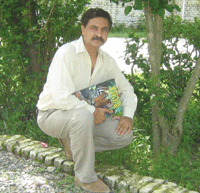 In Dehradun where more than 25 mld (million litres per day) of waste — often toxic — water is discharged directly into rivers, environ-mental activist Sandeep Singh is an individual committed to a life saving mission. For the past 13 years Singh has been in the forefront of saving the River Suswa, flowing past Doodhli village, 30 km east of Dehradun into the Ganga.
In Dehradun where more than 25 mld (million litres per day) of waste — often toxic — water is discharged directly into rivers, environ-mental activist Sandeep Singh is an individual committed to a life saving mission. For the past 13 years Singh has been in the forefront of saving the River Suswa, flowing past Doodhli village, 30 km east of Dehradun into the Ganga.
Singh started SUSWA (Sustainable Use of Soil, Water and Air), an acronym drawn from the river’s name, in 1995. The project, he says, was born out of ten years of research, study and practical experimentation in rural development and forest conservation. The NGO’s mission statement spells out its objectives — “promote sustainable development and harmony with nature; conserve soil, forest and natural resources; empower local people by promoting their crafts, folk art, medicine and culture, and promote organic farming and gardening”. In pursuance of its objectives SUSWA organises awareness programmes on the rights of rural people, animals, birds and trees and has educated more than 20,000 youth in the age group 11-17. These programmes are conducted by volunteers who were erstwhile tiger poachers!
Started with a meagre capital of Rs.20,000, SUSWA is now financially independent. Singh pumps in his earnings from growing sugarcane, rice, wheat and organic vegetables (which he farms at Doodhli) to keep SUSWA alive.
An alumnus of Delhi’s top bracket Jawaharlal Nehru University where he acquired a Masters in Spanish from its School of Languages, Singh worked as a freelance film critic and claims he drifted into directing ecological documen-taries. After one of his early documentaries Chasing the Butterflies won him a bronze medal at the First Indian Wildlife Film Festival in 2001, Singh’s involvement with ecology and environment deepened, prompting him to enroll for a study programme in ornithology at the Bombay Natural History Society and also qualify as an interpretation officer (to guide people through national parks).
Since then for the past decade, he has been active in executing the Annual Asian Mid-Winter Waterfowl Census for Cambridge University at the Assan Barrage (Dehradun), campaigning for protected status for the barrage and saving this habitat of migrant birds. The ‘Save the Tiger’ project at Ranthambore is also in his orbit. Moreover Singh is founder secretary of The Dehradun Hills Academy, a K-XII school erected on his ancestral land in Doodhli which provides boarding school education to 500 students, one-third of whom are children of army jawans and the rest from neighbouring villages.
“We are a small dot on the map of Doon but we have persuaded over 100 people from villages to work to save the Suswa. We are sufficiently motivated to protect it from degenerating into a sewage dump,” says Singh.
Power to your project!
Natasha Pathak (Dehradun)